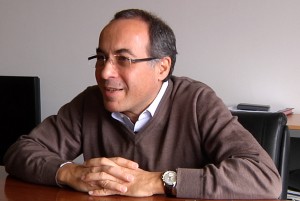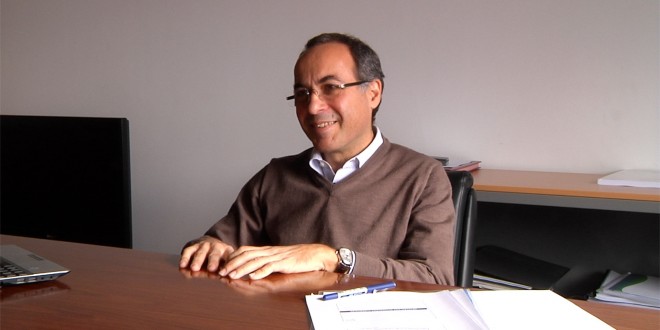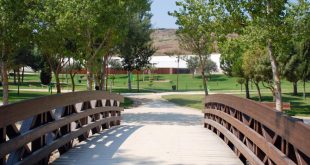At the IPMA – the Portuguese Institute for the Sea and Atmosphere (1), ECO123 talked with Dr. Pedro Viterbo, a member of the IPCC – the International Panel on Climate Change (2) in order to find out more details on the IPCC’s report and its conclusions. We also questioned him about the role of the IPCC in government decisions and sought to learn more about the actions necessary to fostering sustainability in the economy and its ecology without mortgaging the future of generations to come.
ECO123: What is the IPCC?

Pedro Viterbo: The IPCC is a panel set up by the United Nations that at this moment is headquartered at the World Meteorological Organisation. Contrary to what many people think, the IPCC does not do science. What the panel undertakes, every five to seven years, is a general evaluation of that which has been published in the specialist journals ever since the last report. This spans three different facets: the scientific justifications for climate change, the impacts and the adaptation ongoing. I am involved in terms of the justifications for climate change.
What is the role of the IPCC in governmental decision making processes?
The IPCC strives to provide all of the information possible, the most recent and the most credible, to governments in order to underpin their strategic decision taking.
How might the IPCC be able to engage in a more active role in educating and awareness raising among populations in general?
This role is foreseen for the IPCC in terms of how its central team, after launching the report, recommends that we visit schools, companies, local councils and attempt to speak to the different areas of the government to convey the message. What we are also trying to do is to influence school curricular to help in nurturing new mentalities.
When does the next report come out and what does it cover?
The sectorial impact will be published this spring. And what does sectorial impact mean? Let me give you a very simple example: the productivity of rocha pears grown in the west is fundamentally conditioned by the numbers of days of cold. When we know that the temperature is going to rise, what happens is that the current area of rocha pear growing will not be ideal in three to four decades as there shall be lower levels of productivity.
Should the IPCC have greater powers of influence over decision making by governments to force them to adopt the measures appropriate?
That would not seem viable. At the point when the IPCC attempts to influence in a particularly persuasive fashion and beyond its scientific scope, it might lose its independence. Hence, the IPCC (which is a scientific forum) and the United Nations Convention for Climate Change are very separate bodies. The Convention takes everything into consideration: disputes between governments as well as the disputes between ethics and morals.
What measures might be taken to build on our ecological understanding?
In addition to the schools level that I have already mentioned, the ideal level for intervention is at the local government level. Councils are far closer to citizens than national governments. If councils, for example, change the vehicle fleets to electric powered vehicle, this will spread to other councils and the population as this is something that everybody sees. The culture of proximity is the most effective way of conveying this information. The other aspect is really convincing the major companies and their respective markets, for example electricity and water distributors, supermarket chains, to act on the various measures that may count towards the total carbon of each specific product. Also, the efforts we could and should put into cutting back on our ecological footprints. Some companies are already an example.
What does the future hold for Portugal and what measures should be taken by governments and citizens to invert the current situation?
Beyond the generic measures of government, it would be good to take measures more at the local level, inside local councils. This is the level of government at which people see the examples of what is getting done. The majority of national government policies are always abstract to the livelihoods of people in addition to involving new taxes or charges so that we may live the future and such things always prove unpleasant. Positive measures that do not hold any direct cost to citizens always represent examples to society. Replacing the council fleet with electric powered vehicle proves one example to follow as an investment for the future. Furthermore, there has to be an appropriate public relations policy able to explain all this.
ECO123 shall be closely accompanying the IPCC report and the application of its solutions out of an understanding of the urgent need to change behaviours and the paradigms held by society and not to perpetuate still further bad habits. And, above all, we need to attain the generational solidarity necessary for the continuity of the species in balance with the planet.
As such, it is with the greatest satisfaction that we shall draw upon the support of Dr. Pedro Viterbo in forthcoming editions. We seek to better grasp the factors and facts ascertained in conjunction with the conclusions and solutions of the specialists for political decision makers in office. However, this also extends to the impact these shall have on the common citizen.
Pedro Viterbo, member of the IPCC and supervisor of one report chapter.
With a Doctoral Degree in Physics (Meteorology), he runs the Department of Meteorology and Geophysics at the Portuguese Institute of the Sea and Atmosphere.
 Eco123 Revista da Economia e Ecologia
Eco123 Revista da Economia e Ecologia



